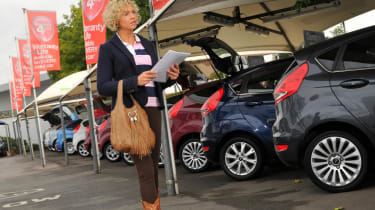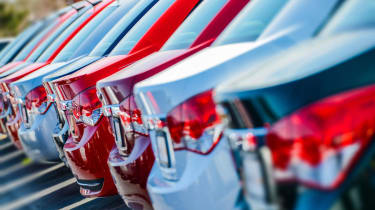Buying a new car on finance is the norm – most people who buy new cars do so using some kind of finance arrangement. It’s also very common for used cars as well, which is good news for anyone thinking about using used car finance – plenty of people are already doing it every day.
You don’t need to be an expert on finance to use it when buying a car, as the salespeople will help you through the process, but it always pays to know what you’re getting yourself into, and you can save money by having the right knowledge before you start. That’s what we’re here for – to explain the basics of used car finance to you and how it all works.
There are different types of used car finance to consider, for a start, and knowing which one will be best for you can help you save thousands of pounds. We’ll take a look at each one here, though if you want more details you can read more about them on the dedicated pages we have for each finance type.
Then there are the things to look out for when considering buying a used car on finance, plus the best ways to get a good deal on a used car generally. We’ll look at all of these areas in this handy guide. The process of using finance to buy a used car is virtually identical to using it on a new car deal, it’s just who you are borrowing from that changes for the most part.
Types of used car finance
Personal Contract Purchase (PCP)
PCP is common when it comes to new car buying, and many dealers and finance companies offer this type of finance for used cars as well. It’s probably the most complicated of the types of used car finance, but it’s not too hard to understand.
You make a deposit on the car to start with, usually about 10 per cent of the car’s value (but the amount is flexible) then a series of monthly payments – usually for three or four years. Then at the end of the PCP agreement there’s an optional ‘balloon’ payment that allows you to own the car outright. If you choose not to pay, you hand the car back and can part ways with the finance provider.
PCP is useful for those who know they will want to change into a different car every three or four years.

Hire Purchase (HP, Conditional Sale)
Hire Purchase is sometimes called Conditional Sale, though the name Hire Purchase is more descriptive. You pay a monthly amount for a fixed amount of time that pays for the car – at the end of the agreement, you own it.
This can often cost more than PCP per month, but it’s good for those who want to own the car at the end of the finance agreement.
Personal Contract Hire (PCH, Leasing)
It might sound similar to hire purchase but PCH is much more like the car hire arrangement you might do on holiday, just over a longer period. You just pay monthly to be able to drive the car, then you hand it back at the end of the term. There’s no option to own the car – you’re simply paying to drive it.
This kind of finance is good for those who will want to change cars after a certain amount of time regardless, as it’s often the cheapest option overall. It’s less common on used cars than new but you will finance leasing deals on nearly new models.
Bank loan
If you are buying a used car privately then you may be best off getting a loan from a bank. This is like using a credit card – you borrow the money to pay a lump sum now, then pay it back monthly. This can be good for people who want to own the car immediately – for example if you want to modify it.
Used car finance tips
Compare quotes
One thing to remember when you are choosing a used car is that you should compare the whole quotes, not just the advertised prices. The first thing to compare is the interest rates – there are two to be aware of. The first is the base rate and the second is called APR. The base rate is simply the amount charged on the money loaned, while the APR includes other fees and costs, so it’s more directly comparable to other loans.
The next thing to check is the total amount payable. You might be tempted by a 0 per cent interest rate, but the total amount you actually pay could be higher than another deal with a higher interest rate. Ultimately the amount of money you pay is the most important thing, so the total amount payable is a key figure to compare.
If it’s not listed or provided to you, you can work out the total amount payable by multiplying the monthly payment by the number of payments, then add any other costs such as a deposit in the case of PCP finance (plus any other fees or charges). This will give you a good figure to compare with other deals.
Don’t forget the balloon payment
Remember that if you buy using PCP, you will have the option to buy the car at the end. If you don’t take this offer up, you don’t have to add this balloon payment on to the total cost.

Think about this decision – if you are unsure about whether you’ll want to buy the car at the end, the PCP is good, but if you know that you won’t keep it, then PCH is a better option in a lot of cases. Hire Purchase is great for those who are sure they want to own the car, but can’t pay for it now and don’t want a bank loan.
Credit scores and length of contract
Your credit score is another factor to consider. Your options may be limited if you have poor credit, but this doesn’t mean it’s impossible to buy a car on finance if you’re in that situation. There are often solutions, but you will probably be treated as higher risk and will have to pay more as a result.
You can lower the monthly payments sometimes by offering a larger deposit at the start of the finance agreement. It’s something to think about – the more you can pay now, the less you’ll pay each month into the future.
It’s a similar story with the length of the agreement. If you are repaying it for a longer amount of time, it’s possible to lower the monthly cost. However it’s worth remembering that a high interest rate will mean the total cost goes up along with the length of time. The faster you pay back, the lower the total cost in most cases, but the actual payments will likely be higher.
Check the car carefully
Finally there are all the other factors that you have to consider when buying a used car. If one car seems far cheaper to finance than another of the same type, it will probably be because of something wrong with the car – whether that’s tired paintwork, high mileage or a lower specification. Make sure you’re happy with the car before you agree to a finance deal. If in doubt, there are plenty of other used cars out there.
Looking to buy a used car? Visit our sister site buyacar.co.uk for a wide range of finance deals…
